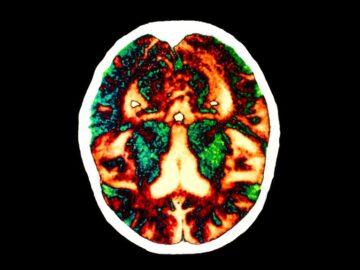From Nature:
 For the past decade, Collinge and his team have studied people in the United Kingdom who in childhood received growth hormone derived from the pituitary glands of cadavers to treat medical conditions including short stature. The latest study finds that, decades later, some of these people developed signs of early-onset dementia. The dementia symptoms, such as memory and language problems, were diagnosed clinically and in some patients appeared alongside plaques of the sticky protein amyloid-beta in the brain, a hallmark of Alzheimer’s disease. The authors suggest that this amyloid protein, which was present in the hormone preparations, was ‘seeded’ in the brains and caused the damage.
For the past decade, Collinge and his team have studied people in the United Kingdom who in childhood received growth hormone derived from the pituitary glands of cadavers to treat medical conditions including short stature. The latest study finds that, decades later, some of these people developed signs of early-onset dementia. The dementia symptoms, such as memory and language problems, were diagnosed clinically and in some patients appeared alongside plaques of the sticky protein amyloid-beta in the brain, a hallmark of Alzheimer’s disease. The authors suggest that this amyloid protein, which was present in the hormone preparations, was ‘seeded’ in the brains and caused the damage.
The work builds on the team’s previous studies of people who received cadaver-derived growth hormone, a practice that Britain stopped in 1985. In 2015, Collinge’s team described2 the discovery of amyloid-beta deposits in the post-mortem brains of four people who had been treated with the growth hormone. These people had died in middle-age of the deadly neurological condition Creutzfeldt-Jakob disease, which is caused by infectious, misfolded proteins called prions. The prions were present in batches of the growth hormone. The four people analysed in that study died before clinical signs related to the amyloid build-up might have been observed. But the presence of these amyloid plaques in blood vessels in their brain suggested they would have developed a condition called cerebral amyloid angiopathy (CAA) — which causes bleeding in the brain and is often a precursor to Alzheimer’s disease.
More here.
